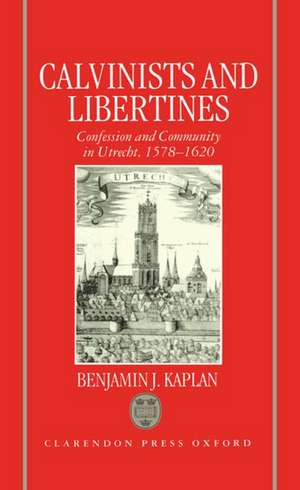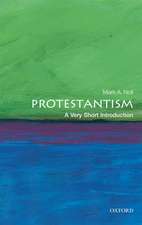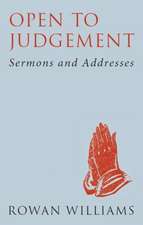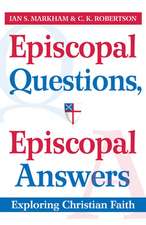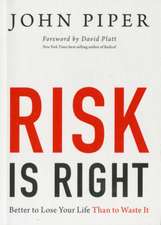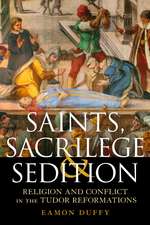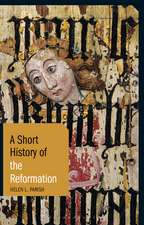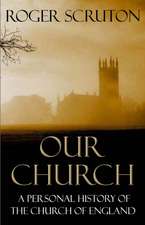Calvinists and Libertines: Confession and Community in Utrecht 1578-1620
Autor Benjamin J. Kaplanen Limba Engleză Hardback – 11 oct 1995
Preț: 1183.62 lei
Preț vechi: 1800.99 lei
-34% Nou
Puncte Express: 1775
Preț estimativ în valută:
226.48€ • 246.79$ • 190.85£
226.48€ • 246.79$ • 190.85£
Carte tipărită la comandă
Livrare economică 12-18 aprilie
Preluare comenzi: 021 569.72.76
Specificații
ISBN-13: 9780198202837
ISBN-10: 0198202830
Pagini: 362
Ilustrații: 2 halftones, 10 maps
Dimensiuni: 146 x 224 x 25 mm
Greutate: 0.56 kg
Editura: Clarendon Press
Colecția Clarendon Press
Locul publicării:Oxford, United Kingdom
ISBN-10: 0198202830
Pagini: 362
Ilustrații: 2 halftones, 10 maps
Dimensiuni: 146 x 224 x 25 mm
Greutate: 0.56 kg
Editura: Clarendon Press
Colecția Clarendon Press
Locul publicării:Oxford, United Kingdom
Recenzii
The value of Kaplan's book consists in its combination of a detailed and thorough presentation of events, based on the study of a broad range of source material, with a structural analysis explaining and not merely describing the developments in Utrecht. It stands as an important contribution to the history of the Dutch Republic and to the debate over the usefulness of the notion of confessionalization in Europe in the late sixteenth and early seventeenth centuries.
Bernard Kaplan has produced an important work that deals with the process of confessionalization in Reformation and post-Reformation Utrecht. Kaplan has produced a fascinating account of the process of confessionalization in Utrecht, a city that has hitherto received little attention from Reformation historians. This work is admirably documented with archival sources and it is well written. The book is an excellent example of the recent trend in reformation history to combine elements of social, political and religious history into a coherent whole.
one of the most rewarding local studies to have appeared recently
In my opinion, this book belongs to the 'top ten' st.s in Ref. hist. of cities. It is based on thorough investigation as well as on extensive knowledge of the field, and it produces its results with an unusual clearness. In the same time it also provokes a fudamental discussion concerning its starting points and on essential questions of detail. In short: an impressive contribution to Ref. hist.
a magisterial treatment of the Remonstrant controversy in Utrecht ... It is hard to do justice to the breadth of insight which Kaplan displays in his superbly contextualised local study of the Reformation. It is a sterling contribution to the intellectual and social history of reformation Europe which should not be ignored by any scholar or student of the sixteenth and seventeenth centuries. What a pleasure to read a book which uses detail to draw out fresh interpretations of large questions, and which presents coherent conclusions, rather than simply obscuring or fragmenting an existing portrait of the past.
this book has important ramifications not only for scholarship on the Dutch Reformation, but also for the study of confessional development in Reformation Europe ... perhaps the most important contribution of this very fine book is the precision with which Kaplan describes Dutch Libertinism ... Kaplan provides a persuasive account of how a distinct blend of civic culture and confessional identity came to coexist in Utrecht ... Scholars working in other Dutch cities will find his book a useful guide in sorting out this complex issue ... One can only hope that this nuanced and eloquent study of Utrecht will begin to insert the Netherlands into the scholarly discussion of confessionalism and society in Reformation Europe.
this study is a valuable contribution to our understanding of religious developments in the formative years of the new Dutch state
Bernard Kaplan has produced an important work that deals with the process of confessionalization in Reformation and post-Reformation Utrecht. Kaplan has produced a fascinating account of the process of confessionalization in Utrecht, a city that has hitherto received little attention from Reformation historians. This work is admirably documented with archival sources and it is well written. The book is an excellent example of the recent trend in reformation history to combine elements of social, political and religious history into a coherent whole.
one of the most rewarding local studies to have appeared recently
In my opinion, this book belongs to the 'top ten' st.s in Ref. hist. of cities. It is based on thorough investigation as well as on extensive knowledge of the field, and it produces its results with an unusual clearness. In the same time it also provokes a fudamental discussion concerning its starting points and on essential questions of detail. In short: an impressive contribution to Ref. hist.
a magisterial treatment of the Remonstrant controversy in Utrecht ... It is hard to do justice to the breadth of insight which Kaplan displays in his superbly contextualised local study of the Reformation. It is a sterling contribution to the intellectual and social history of reformation Europe which should not be ignored by any scholar or student of the sixteenth and seventeenth centuries. What a pleasure to read a book which uses detail to draw out fresh interpretations of large questions, and which presents coherent conclusions, rather than simply obscuring or fragmenting an existing portrait of the past.
this book has important ramifications not only for scholarship on the Dutch Reformation, but also for the study of confessional development in Reformation Europe ... perhaps the most important contribution of this very fine book is the precision with which Kaplan describes Dutch Libertinism ... Kaplan provides a persuasive account of how a distinct blend of civic culture and confessional identity came to coexist in Utrecht ... Scholars working in other Dutch cities will find his book a useful guide in sorting out this complex issue ... One can only hope that this nuanced and eloquent study of Utrecht will begin to insert the Netherlands into the scholarly discussion of confessionalism and society in Reformation Europe.
this study is a valuable contribution to our understanding of religious developments in the formative years of the new Dutch state
